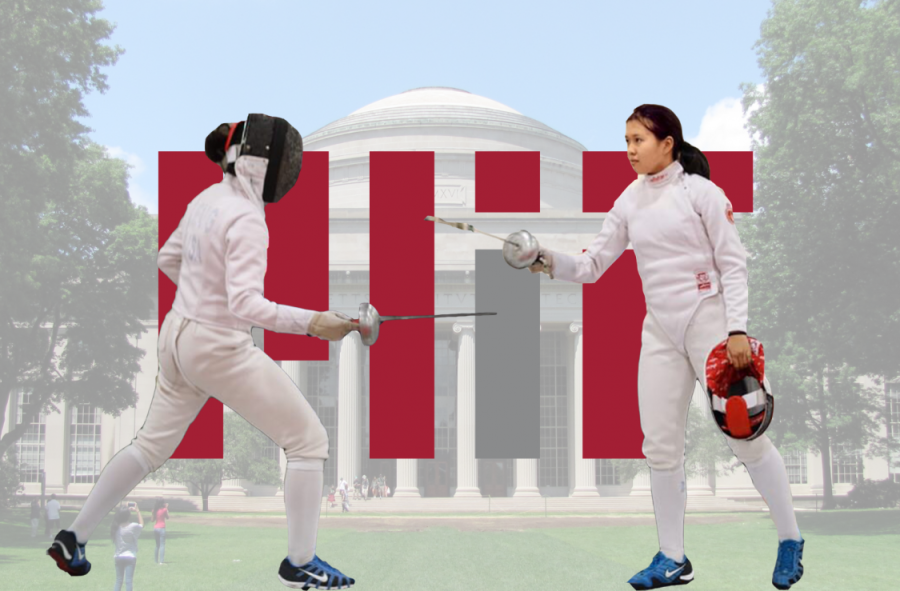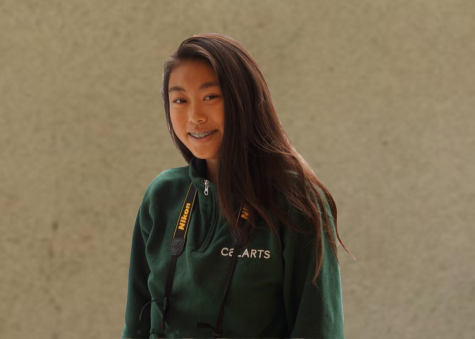The best of both worlds: Andrea Leang takes on fencing and MIT
Graphic illustration by Katie Chen
Andrea Leang poses in fencing attire.
February 3, 2021
Juggling excellence in both athletics and academics is no easy feat for 21st-century teens, but one Lynbrook senior has it all under control. At 18, Andrea Leang has a slew of impressive fencing achievements and an acceptance to the prestigious Massachusetts Institute of Technology (MIT).
Leang was born in New York, but her family moved to Shanghai after she finished second grade. During that time, her mother wanted her younger sister to participate in an activity in which Leang was not already involved, so she signed Leang’s sister up for fencing. As Leang sat on the sidelines during one of her sister’s lessons, the coach invited Leang to join the fencers. Motivated by the coach’s offer of a snack in reward, Leang agreed — and she never looked back. Although Leang was unathletic and easily worn out by physical exertion at the time, she improved her fitness while fencing with friends and soon found practice to be enjoyable.
“One of the biggest things in fencing is community,” Leang said. “No matter where you go, you’re definitely going to find some fencer friends.”
Fencing involves three types of weapons: the foil, which is the lightest and targets the torso and back with thrusting; the sabre, which targets the whole body with slashing; and the épée, which targets the whole body with thrusting. Leang selected the épée right off the bat because it was her sister’s weapon of choice.
“The foil and sabre are both fast-paced, while the épée is the slowest one, which fits me best because I don’t like running or moving a lot,” Leang said.
When Leang began taking fencing lessons, her coaches helped her to develop basic movements with the épée such as parrying, a defensive move that blocks an opponent’s blade to avoid receiving a hit; and disengaging, in which a fencer moves the blade around an opponent’s parry. Over time, her training helped her to refine her personal style. Two years after her debut in the sport, she began to take fencing more seriously; she recalls telling her mother that her dream was to earn a place on the U.S. national team.
When Leang was in seventh grade — four years into her fencing career — her family moved back to the U.S.. She was initially taken aback by the sharp contrast in fencing practices between the two countries.
“In China, my coaches emphasized the importance of getting each movement very clean and precise; once you’ve mastered the moves, you can go on to do offense with the other kids,” Leang said. “In America, a lot of the emphasis is on throwing the kids into the ring and building upon their weaknesses, as observed by the coaches, so it was kind of a weird transition.”
In addition, competitions in China do the rankings by hand, meaning that there is typically an hour or two between rounds. During her first competition in the U.S., though, Leang recalls almost missing her elimination round because rankings are digitized and therefore occur much faster in the U.S..
Leang has been fencing with the Academy of Fencing Masters in Sunnyvale since seventh grade and attributes much of her love for fencing to the sense of community and sportsmanship in her coaches, peers and competitors there.
“Everyone respects each other, and you’re enemies while fencing but friends off the strip,” Leang said. “Even if they have been eliminated or aren’t competing that day, people usually go to cheer on their club members, and we do team events for bonding as well, [even though fencing is typically an individual sport].”
Furthermore, Leang views competitions as opportunities to further develop her fencing style and strategy by observing others.
“Much of my journey in fencing is about self-improvement,” Leang said. “There are some familiar names in the top rankings for my age group that I look up to because there is something about their style of fencing, such as timing or execution, that I admire. Everyone has their strengths and weaknesses, and I would say that my style is a mix of different things I’ve tried to incorporate based on my observations. One cool thing about fencing is that you’ll sometimes get the opportunity to fence Olympians, which is always a good challenge.”
Recently, Leang fenced world-ranked Harvard University fencer Emily Vermeule and noted that they share a similar style of fencing, providing her with a good frame of reference to improve her strategy. After losing to Vermeule once, Leang focused on analyzing Vermeule’s style and was the only person to win a match against Vermeule later that day. Experiences like these have been instrumental in her development as an athlete throughout the past several years.
Through fencing, Leang and her team have explored several countries and cultures while traveling internationally for competitions. Two of their most memorable destinations have been El Salvador and Puerto Rico. Despite the language barriers in these foreign regions, Leang and her family enjoyed leaving their comfort zones both athletically and culturally.
Leang believes that her dedication to fencing has also contributed to her success in academics; she attributes to fencing her time management skills and her ability to pinpoint and address her areas of weakness — skills that she will undoubtedly take to MIT as she splits her time between fencing and her studies in Electrical Engineering and Computer Science.
Leang began communicating with an MIT fencing coach in February 2020, immediately before the 2020 Pan-American Championships, and continued to do so throughout the remainder of the year. As MIT is a Division III school, though, Leang was not officially signed to its fencing team; but rather applied via Early Action with the intention of joining the fencing team after matriculating, and was accepted.
In the next few years, she hopes to continue building her stamina while competing in the NCAA championships with her team at MIT. Whether or not Leang decides to take her fencing career beyond her time as an undergraduate, fencing will remain a significant part of her life and character.


































































